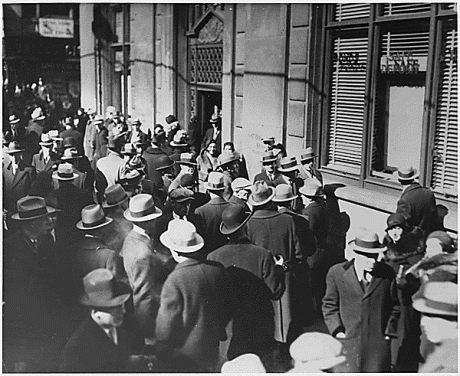Mikhail Khazin: U.S. will soon face second “Great Depression”
November 16, 2008

Renowned economist Khazin predicted U.S. financial crisis in 2000
KP.RU, Yevgeniy Chernyx — 29.10.2008
Five years ago, I ran the cultural section at Komsomolskaya Pravda. Publishing houses used to send me their new releases now and again for review. One day, after digging through the latest shipment of such literature, I stumbled upon a book titled, “Sunset of the Dollar Empire and the End of the Pax Americana.”
I remember reading the title over to myself several times in disbelief. Way back when, Soviet Americanologists loved to debate the collapse of the U.S. financial empire. But this book was published in 2003.
I flipped through the pages, skimming over the text. The conclusions of the author — an economist named Mikhail Khazin — seemed convincing enough. So I gave the book to our economics columnist at KP Jenya Anisimov, who wrote a review and interviewed the author later at our editorial offices.
All these years, I kept Khazin in the back of my mind, and followed his career as he spoke at various conferences throughout Russia. He seemed certain the U.S. was teetering on the verge of an economic collapse, while other analysts were quick to refute his theory. Now, as his once unfathomable prognosis begins to come true, KP contacted Khazin for an interview.
Fired from the Kremlin!
KP: Mikhail Leonidovich, how did you end up predicting the current financial crisis?
Khazin: In the spring of 1997, the Kremlin established the Presidential Economic Department. I was made the deputy head of the unit. Our first task was to prepare a report for [former President Boris] Yeltsin about the economic situation. We realized an economic crisis was pending in Russia and would take place in the late summer or early fall of 1998 if the country”s economic policies weren’t changed.
KP: What view did the higher echelons take of your report?
Khazin: They didn’t really take any view at all. No one read the text except for the deputy head of the administration and Yeltsin himself. In the summer of 1998, we were fired from the presidential administration for trying to stop a business project titled, “State Treasury Bills— Exchange Rate Corridor.” This was the biggest financial scheme of the post-Soviet era. Just as we had predicted, an economic crisis gave way that August. Together with my colleagues, I continued researching the reasons behind the crisis.
After becoming seriously consumed in our studies of the U.S. financial system, we found an unprecedented parallel. Just as our T-bill market had sucked all the juices out of the Russian economy, the U.S. financial market was sucking the resources out of the entire planet. We realized a similar fate awaited the U.S. financial system. Our article was published in the summer of 2000 in the “Ekspert” magazine, titled, “Is the U.S. Digging for an Apocalypse.” We concluded that it was just as impossible to avoid an economic crisis in the U.S. as the financial collapse in Russia.
Playing the idiot
KP: The U.S. obviously didn’t listen to the song written by [the renowned Russian rock group] LUBE during perestroika, “Don’t Play the Fool, America!” Seriously, though, what’s the real reason for the economic collapse? Let’s try to do this without any heavy duty financial terms…
Khazin: I’ll try! The economic model that led to the collapse was the result of a crisis in the 1970s. This was a terrible financial crisis that was the result of surplus capital. Even the 19th-Century classics in economics literature concluded that capital grows faster than labor provides compensation. As a result, there is a lack of demand. In traditional capitalism, this problem is solved on account of crises in excess production. And in an imperialistic system, the problem is solved on account of capital outflow. But by the 1970s, these solutions had run their course. However, the internatinoal situation demanded the U.S. either make a great scientific and technological leap forward or lose the Cold War to the USSR. The administration of [President Jimmy] Carter and the head of the Financial Reserve System Paul Walker developed a very tricky concept. For the first time in the history of capitalism, capitalists began helping others, issuing new currency in an effort to stimulate aggregate demand .
KP: They decided to switch on the printing press?
Khazin: Exactly. In the early 1980s, they started to stimulate demand through state support. For example, they launched the “Star Wars” program. As of 1983, they placed an emphasis on the household economies.
KP: You mean, they relied on the average citizens?
Khazin: Yes. For an entire quarter century, households received funds as a result of issuing new currency in larger and larger quantities.
KP: In other words, credit?
Khazin: Yes. The U.S. was able to make the next step in technological progress as a result of this excess demand. They accomplished the collapse of the USSR and numerous other significant fears. But… The boom took place thanks to resources that were supposed to provide for future growth. The country ate its own resources two generations ahead of time. The U.S. built up tremendous debt. This is clearly seen if we compare the growth of debt in U.S. households with the entire U.S. debt and GDP. The economy is growing at an annual rate of 2-3, or at a maximum 4 percent. But debt is increasing at a rate of 8-10 percent.
KP: Well, let the debt keep growing… The U.S. lived fine up until now without a problem… Better than we did!
Khazin: Yes, the U.S. did create a very high standard of living by stimulating consumer demand. Generations lived without having to experience poverty. But it’s impossible to live forever in debt. Household debt has now surpassed the national economy — more than $14 trillion. Now it’s time to pay up. Of course, Wall Street tried to postpone this collapse. I won’t go into detail about derivatives and other such financial assets, but this was just a gasp for air before an inevitable death.
Another problem in the U.S. is that powerful industries were built around this growing demand. Whatever decision Wall Street takes right now, the demand is going to fall. What will happen to these industries? In 2000, we estimated that 25 percent of the U.S. economy would disappear. Today, we think the number is closest to one-third — if not more.
KP: That’s a lot!
Khazin: That’s an incredible amount! But what exactly does this mean — the destruction of one-fourth of the U.S. economy? It means an uncontrollable increase in unemployment, a horrible depression, a sharp increase in the effect of social services on the budget… Now, the U.S. is jumping all over the place doing everything its can to rescue this fraction of the economy. The government is stimulating banks and manufacturing… But regardless, in 2-3 years, the U.S. will face a crisis similar to the Great Depression.
Who is Who
Mikhail Leonidovich Khazin was born in 1962. He studied mathematics at the Yaroslavl University and Moscow State University. In 1984-1991, he worked at the Soviet Academy of Sciences. In 1993-1994, he worked at the State Working Center of Economic Reforms. In 1995-1997, he was the head of the Credit Policy Department at the Economics Ministry. In 1997-1998, he was the deputy head of the Presidential Economics Department. In June 1998, he left state service. At the moment, he is president of the consulting firm, Neokon.
Day of Reckoning? Super Rich Tax Cheats Outed by Bank Clerk
Technician in Liechtenstein Turns Over Names of Americans With Secret Bank Accounts
By BRIAN ROSS and RHONDA SCHWARTZ
July 15, 2008—
Hundreds of super-rich American tax cheats have, in effect, turned themselves in to the IRS after a bank computer technician in the tiny European country of Liechtenstein came forward with the names of US citizens who had set up secret accounts there, according to Washington lawyers investigating the scheme.
The bank clerk, Heinrich Kieber, has been branded a thief by the government of Liechtenstein for violating the country’s bank secrecy laws.
He is now in hiding but scheduled to testify to the Senate’s Permanent Subcommittee on Investigations Thursday via a video statement from a secret location, according to Congressional investigators.
Aides for committee chairman Carl Levin (D-MI) are scheduled to provide reporters with a background briefing later this morning in Washington on the committee’s investigation of tax haven banks in Liechtenstein and Switzerland.
Aides say the hearing will also focus on the role of the giant Swiss bank UBS and its alleged efforts to help wealthy Americans hide their money from the IRS through shell companies in Liechtenstein.
Liechtenstein’s veil of secrecy was pierced five years ago when the disgruntled technician, Kieber, downloaded the names of foreign citizens connected to the secret accounts.
Kieber reportedly sold three CD’s full of names and data to tax authorities to 12 countries including Germany, Great Britain, France, Italy and the United States.
Tax authorities in Italy published the full list of names.
In Germany, the disclosures led to the arrests of several prominent CEO’s on charges that had evaded millions of dollars in taxes.
A former UBS private banker, Bradley Birkenfeld, has agreed to a plea deal and is reported to be cooperating with US authorities in bring charges against American citizens on tax evasion charges.
The Liechtenstein bank, LGT, is owned by the tiny country’s ruling family led by Prince Hans-Adam II.
Kieber’s Washington lawyer, Jack Blum, says Kieber should be considered a whistleblower and a hero, not a thief, for revealing how the super rich hid billions of dollars using the Liechtenstein bank.
The names of the US citizens are now in the hands of the IRS and Senate investigators.
Washington lawyers say a number of prominent citizens have been subpoenaed to testify but have already indicated they will refuse to testify, asserting their Fifth Amendment right against self-incrimination.
It is not yet clear whether Senator Levin will insist they appear in front of the committee anyway.
Click Here for the Investigative Homepage.
